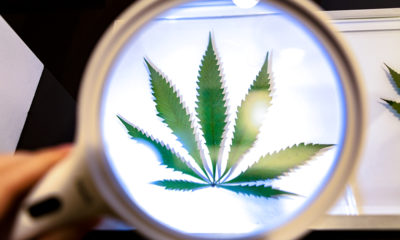
Medical
Police Want Access To Medical Marijuana Records To Bust Gun Owners
Law enforcement in Pennsylvania are trying to gain access to information about medical marijuana to enforce firearm laws.
In spite of marijuana legalization in parts of the United States, law enforcement in those areas remain hellbent on finding new and improved ways to bust those who use this substance. And it’s not just about getting stoned drivers off the road either — although that is a big part of it. Cops are wanting access to medical marijuana patient registries so they can just start showing up at the residences of these people and arresting them if they own a gun. To get the ball rolling on these Gestapo tactics, police forces are trying to convince the higher-ups that public safety is in jeopardy as long as they are in the dark about which citizens are out there using medical marijuana.
Although cannabis has been legal in Pennsylvania for therapeutic use for the past three years, cops are still throwing a temper tantrum over their inability to access the state’s medical marijuana registry. Some of them, like drug recognition lackey Craig Amos, believe the state’s secrecy on the issue has created a “huge disconnect.” Because now, there is a possibility that society is full of marijuana users that also own firearms. And that is a volatile predicament that they wish to remedy by any means necessary.
“If we had access (to the marijuana user database), then we’d have state troopers showing up at someone’s door, arresting them for a felony violation because they lied on a form to purchase a firearm,” Amos told a crowd of around 80 police officers, according to the Intelligencer.
The discussion over medical marijuana and gun ownership is perhaps one of the most controversial of the heated subjects surrounding the cannabis plant. But the rules on this issue are relatively cut and dry.
Since the federal government still considers marijuana an outlaw, Schedule I substance, marijuana users, even those acting in accordance with the laws of their respective state, cannot legally own guns. Section 802 of the Controlled Substances Act makes that clear. Essentially, a person forfeits their Second Amendment rights once they make the decision to participate in a medical marijuana program.
Even the courts support this madness.
Last year, the U.S. Court of Appeals for the Ninth Circuit in San Francisco handed down a verdict that said no constitutional violation was made in preventing medical marijuana patients from purchasing guns.
“Registry cardholders are more likely to be marijuana users, and illegal drug users, including marijuana users, are more likely to be involved in violent crimes,” wrote a three-judge panel. “Accordingly, preventing those individuals who firearm dealers know have registry cards from acquiring firearms furthers the Government’s interest in preventing gun violence.”
But it’s not as though that dastardly Uncle Sam has a special B.S. detector that sounds an alarm each time a registered medical marijuana patient purchases a firearm. Marijuana users are just supposed to be forthright about their use when filling out the form (4473) required to buy, sell, or transfer a gun. Failing to provide the government with this information can lead to felony charges.
This was made clear in a letter issued in 2011 by the Bureau of Alcohol, Tobacco, Firearms and Explosives.
“Any person who uses or is addicted to marijuana, regardless of whether his or her State has passed legislation authorizing marijuana for medicinal purposes, it is an unlawful user of or addicted to a controlled substance, and is prohibited by Federal law from possessing firearms and ammunition.”
Pennsylvania officials fully understood there was going to be trouble if they shared information about medical marijuana patients with the police. It is for that reason that the state’s Department of Health, which oversees the patient registry, has denied law enforcement any access to those records. This is apparently causing some cops to lose sleep at night. They feel it creates a situation where medical marijuana patients could fudge form 4473 and still purchase weapons.
But it’s not just the thought of marijuana users owning firearms that has Pennsylvania cops all riled up. They are perplexed altogether by the evolving cannabis scene — on everything from the latest cannabis products to spotting impaired drivers. This is why drug recognition experts, like Amos, from the Pennsylvania DUI Association, are traveling around giving cops the 411 on the cannabis culture of today.
They are teaching law enforcement officers that kids smoking weed in this day and age no longer smell like “grapes or blueberry” from smoking joints (WTF?) and that consumption is about “vaping, extracts and oils.”
Police are also learning how to make arrests in the newly legal climate by identifying equipment used in the production of concentrates, as well as gaining an understanding of when it might be time to send a vape pen in for lab testing. Apparently thicker vape pens are more likely to spawn a shakedown.
And when it comes to yanking stoned drivers off the road, cops are being told that the drivers out there taking it easy are not the high ones. On the contrary, Amos suggests, high drivers are almost always caught because they are driving too fast. “They’re not out there driving slow,” he said. “They’re going 75 (mph) when they’re supposed by going 35 (mph). When they’re using, they think they’re better drivers.”
Clearly, the disconnect is real.
TELL US, have you ever owned a gun?
























